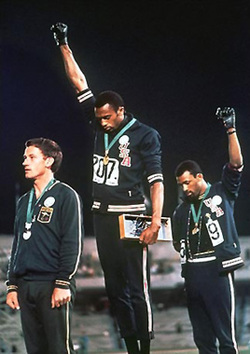
Former UK Olympics Ambassador Sebastian Coe said he was against boycotts and maintained that they only damaged the athletes. Columnist David Fearnhead went further saying that ‘South Africa did not end apartheid because the Springboks weren't allowed to play international rugby’ in an aside that deals lightly with the most successful sports boycott ever mounted. People may forget that South Africa was barred from almost all international athletic competitions, including the Olympics, from 1964 to 1991 and campaigners like the poet Dennis Brutus paid a high price for their part in achieving this. Besides imprisonment on Robben Island, he was exiled and shot in the back. Tellingly, the first ambulance called to attend him when he was shot, was sent away as it was for whites only. Tread lightly on the sacrifices made in the name of sports boycotts. Dismissing them as ineffective is to deny a bloody and hard-won place in political history.
The truth, of course, is that boycotts on their own do not bring down oppressive regimes. Neither do the protests of the athletes themselves. But who can deny the effect on public opinion of the many examples where Olympians themselves demonstrated their commitment through their efforts? Jesse Owens confounding Hitler’s eugenics beliefs by winning four gold medals in the 1936 summer Olympics, Tommie Smith and John Carlos highlighting civil rights anger by raising two black gloves at their awards ceremony in 1968 and the many athletes who not only stayed away, but were loud and vocal in their reasons for doing so.
Perhaps in this case, as acknowledged by Fry, the answer is for athletes to make a stand against inequality in Sochi by protesting in similar ways, either by emphasising to the media and the Russian organisers that they are gay after winning their event and daring them to arrest them or by finding their own way of expressing solidarity through protest. After all, doesn’t every athlete want to compete on a level playing field? Isn’t that supposed to be part of the Olympic ideal?
In any event, Coe’s view that boycotts never work needs countering. It is not acceptable to say athletes are above politics any more than it was right for the rock group Queen to make the same claim when they ignored the boycott of Sun City during the apartheid era before eschewing their ‘we’re just simple rock stars not politicians’ stance to play at Nelson Mandela’s birthday many years later. All of a sudden it becomes very necessary to line up and show your political commitment to something when the barometer of public opinion has swung behind the cause already won by those who were not so mealy-mouthed. It takes a lot more courage to do so, when everyone is lining up to tell you your gesture would be futile and that your training and ambition would be crushed by allowing such trifling matters as discrimination and inequality to affect your decision on whether to stay away or to compete and then protest.
“I don’t think one can place sport in such a high category as to say that it was instrumental in bringing about change, but I think what it did, it focused people’s attention on the fact that we couldn’t live almost a dual life in terms of which in everyday society we were denied basic rights, we were denied the opportunity to exercise our universal rights and then go and play sport as if it was a normal world. So from that point of view the political influence in sport played a tremendous role in bringing across to people that society is far broader than simply the question of where you stay and what you are allowed to do etc.
It also has to deal with interaction between human beings, and you can’t be equal on the weekend when you play sport but then for the rest of the week you are treated as being unequal.” Joe Ebrahim. Former President- South African Council on Sport
 RSS Feed
RSS Feed